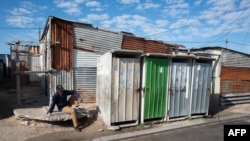Nelson Mandela was a global icon who inspired the world, spending 27 years in prison for his fight against the South African apartheid regime and going on to become the country’s first black president.
Former comrades, family and analysts say Mandela, who died 10 years ago, would have been disappointed in the state of South Africa today.
Mandela, arguably the world’s best-known and most beloved South African, died on Dec. 5, 2013, at the age of 95.
His greatest achievement was bringing freedom and democracy to South Africa with his African National Congress, or ANC, party, after decades of brutal white minority rule.
He forgave his former enemies and ushered in one of the world’s most progressive constitutions. South Africa was seen as a moral example and beacon of hope worldwide.
Mandela served one term in office.
Even before his death, however, while he was in retirement, his once-storied ANC had become embroiled in corruption scandals — most notably under one of his successors, former President Jacob Zuma.
Today, critics accuse the party of only caring about self-enrichment and failing to deliver a better life for most of South Africa’s impoverished citizens.
They say Madiba, as he was widely known, would have been disappointed.
Peter Hain was a friend to Mandela and noted anti-apartheid activist whom apartheid security forces attempted to assassinate with a letter bomb in 1972.
“He would have been absolutely appalled at the decay in the country, the continued rampant corruption, including by some Cabinet ministers…. who are members of his once proud African National Congress,” Hain said.
Many other ANC stalwarts and surviving Mandela contemporaries declined to comment.
However, one of the statesman’s grandsons, Ndaba Mandela, echoed the view that Mandela would have been disappointed.
“Of course, my grandfather Madiba would have been very disappointed to say the least, to see what’s happened with the current ANC, with this party that he loved so much," he said. "Do I think some of the party members are letting down the ANC? Of course they are. We have ministers who are on a feeding frenzy."
Lumkile Mondi, an economics professor at the University of the Witwatersrand in Johannesburg, described what he said are the main problems facing South Africa today.
“Levels of unemployment are very, very high, at about 32.5%; more importantly, inequality has deepened. So has poverty. Infrastructure, whether it’s water infrastructure, road infrastructure, energy infrastructure, has collapsed,” he said.
Next year marks 30 years since the first democratic elections in South Africa and voters will head to the ballot box once again. Numerous polls are suggesting the ANC will lose its majority for the first time.






